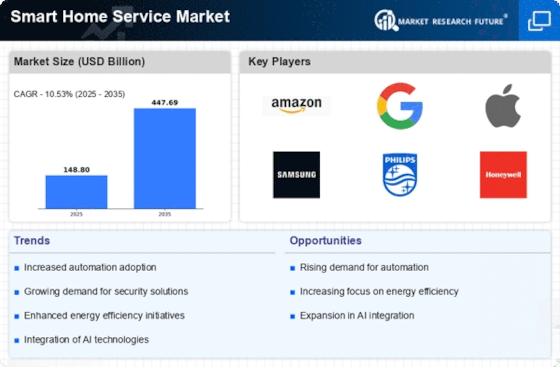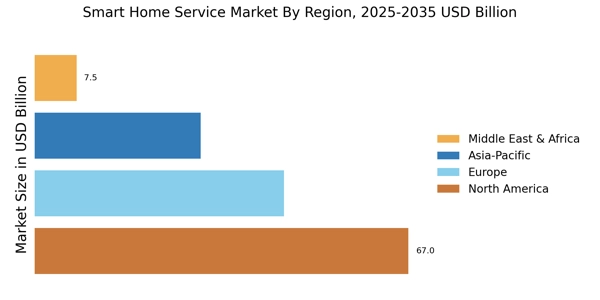Growing Demand for Convenience
The Smart Home Service Market experiences a notable surge in demand for convenience-driven solutions. Consumers increasingly seek technologies that simplify daily tasks, such as automated lighting, smart thermostats, and voice-activated assistants. This trend is reflected in the rising adoption rates of smart home devices, with estimates suggesting that the number of connected devices could reach 75 billion by 2025. As lifestyles become busier, the appeal of smart home services that enhance convenience is likely to drive market growth. Furthermore, the integration of these services into everyday life fosters a seamless user experience, which is essential for consumer satisfaction and retention in the Smart Home Service Market.
Enhanced Focus on Home Security
The Smart Home Service Market is witnessing an intensified focus on home security solutions. With increasing concerns about safety and property protection, consumers are gravitating towards smart security systems that offer real-time monitoring, remote access, and advanced features such as facial recognition. Market data indicates that the home security segment is projected to grow significantly, with estimates suggesting a compound annual growth rate of over 20% in the coming years. This growth is driven by the desire for peace of mind and the convenience of managing security systems through mobile applications. As a result, the demand for integrated security solutions is likely to bolster the Smart Home Service Market.
Integration of Smart Home Ecosystems
The Smart Home Service Market is experiencing a trend towards the integration of smart home ecosystems. Consumers are increasingly looking for comprehensive solutions that allow for the seamless operation of various devices within a single platform. This integration enhances user experience by providing centralized control and automation capabilities. Market data indicates that the demand for interconnected smart home systems is on the rise, with many consumers preferring solutions that can be easily managed through a single application. As companies continue to innovate and develop compatible devices, the Smart Home Service Market is likely to see substantial growth driven by this trend towards ecosystem integration.
Rising Awareness of Energy Efficiency
The Smart Home Service Market is significantly influenced by the rising awareness of energy efficiency among consumers. As energy costs continue to rise, individuals are increasingly seeking solutions that help reduce consumption and lower utility bills. Smart home technologies, such as energy-efficient appliances and smart thermostats, play a crucial role in this shift. Market analysis suggests that the demand for energy-efficient smart home solutions is expected to grow, with consumers prioritizing sustainability in their purchasing decisions. This trend not only contributes to environmental conservation but also positions the Smart Home Service Market as a key player in promoting energy-efficient living.
Advancements in Internet of Things (IoT) Technology
The Smart Home Service Market benefits from rapid advancements in Internet of Things (IoT) technology. The proliferation of IoT devices enables seamless communication between various smart home products, enhancing their functionality and user experience. As connectivity improves, consumers are increasingly inclined to adopt smart home solutions that offer interoperability and automation. Market projections indicate that the IoT sector is expected to grow exponentially, with billions of devices anticipated to be connected by 2025. This technological evolution not only enhances the appeal of smart home services but also drives innovation within the Smart Home Service Market, as companies strive to develop more sophisticated and user-friendly solutions.

















